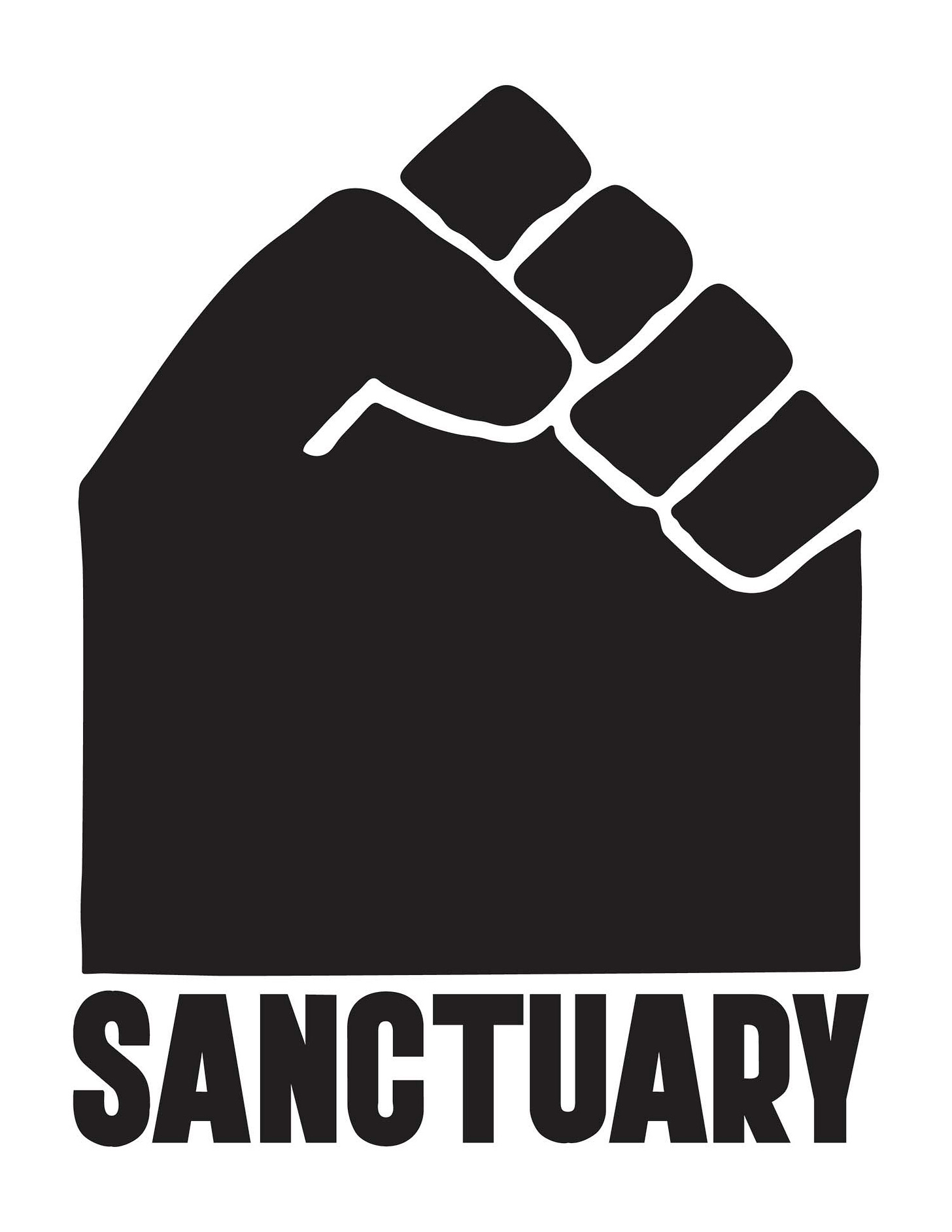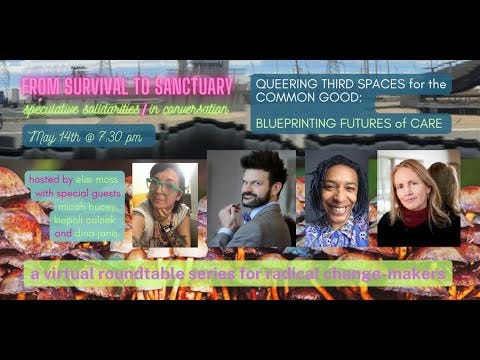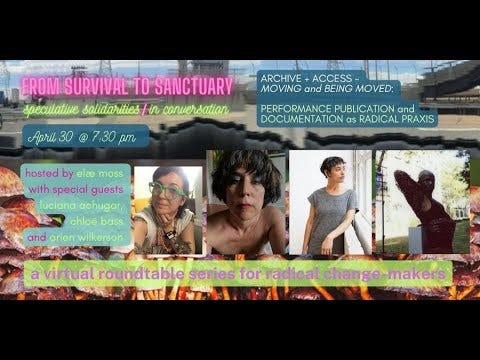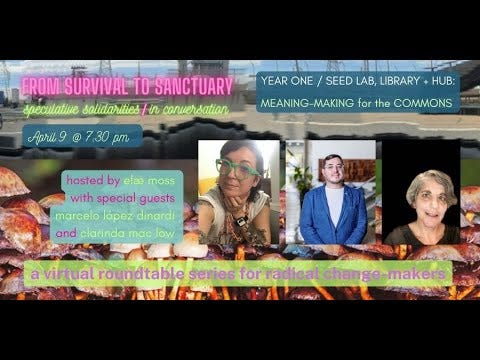This episode is the first in a series I’m calling “From Survival to Sanctuary,” which will be released in the weeks ahead alongside a free online event series of the same name, which I hope you’ll join me for! These events, for which I’ll be joined by incredible guests – artists, thinkers, researchers, organizers, students, and radical faith leaders – are being produced in collaboration with the Center for the Advancement of Public Action at Bennington College, where I’ll soon finish my two years as a Public Action fellow. You’ll find information about these here on Substack and across my social media channels.
In the last episode, A FIELD GUIDE for SELF-IMMOLATION, I introduced some big questions I’ve been asking myself recently – and by “myself,” I mean… anyone who would listen (thanks beloveds!)
Over the course of this series, we’re going to be returning to some of these questions, starting with how we perform and build sanctuary, and how we move to enact and build collective care, in the service of liberation for all beings and bodies.
So, listener, what if anything does sanctuary mean to you? Is it something mythological or does it feel available to you? Does it feel like something you or we have the power to create?
As we consider how and when we might reach this dreamy oasis, today we’re going to dig into the ways we’ve been taught we need to act to survive. Why? Because I think there’s clues there to help us understand what keeps us from building or receiving sanctuary– and maybe what keeps us from believing it – or perhaps, simply, safety? – really, truly, exists.
I know that many of you, like me, are dreaming of futures that look a lot different from our current systems of power and harm. But I’m wondering: are you, are we, ready to believe in them? Am I?
I was going to say that it might take a leap of faith to get us from here to there, but what does a leap of faith actually look and feel like? Have you ever, really, taken one completely, not one where you’ve still got one foot in the known? I want to say I have, I want to say I do this all the time, but in reality I want to sit with this more. Because it turns out… I’m pretty scared. And I think that’s ok. And I want to feel this, maybe more than I want to think about it – and I guess today I’m inviting us to do both.
Here’s a first set of questions for you to feel into as you’re thinking about this with me – I’d love if you shared any of what comes up for you, if you’re called to!
TO CONSIDER:
What would it take for you to trust the safety of forms of care and support that don’t fully exist yet? What would it take to trust that sanctuary could be found in the others with whom you are building these systems, and to move beyond the ways you learned to survive?
And: what if we’re actively keeping the systems we say we want to dismantle strong because we’re terrified of …dying? In both the literal way and others. (Which is to say: social death, professional death, financial death, etc)
Put another way: how are we reinforcing the systems we say we want to break down every day by fearing that they’re the only way to survive, even though we know on some level they’re what’s keeping us from true and lasting sanctuary?
The simplest definition of sanctuary describes it as, simply, “a place of refuge or safety.” Politically and otherwise, maybe we think of it as a place or state where migrants, refugees, dissidents or other vulnerable people are safe from various forms of persecution.
For me right now I’m realizing that even within physical spaces that might technically be named sanctuary that something more… human… can be missing. And (as thousands of migrants are learning as they arrive in so-called Sanctuary cities like New York right now) there is all too often the sinking realization that their promise of safety is in fact temporary or fleeting.
So, on the one hand, I’m asking if we truly believe that a systemic, practical, shelter -and-water-and-food-taken-care-of kind of future sanctuary condition can or will ever exist. Which maybe is a gigantic question about whether humans can or have ever been truly interdependent in a way that isn’t motivated by self-serving, competitive, aims.
But maybe underneath this, I guess, I’m asking about whether you, or I, truly believe in the possibility of sanctuary for the human heart and spirit, which might not have a physical location at all. It might be a place, system, or relationship where this feeling is present, whether or not it also provides physical resources or support.
My brain is spinning, and I’m trying to locate the feeling I have around this – I think… mmm, I think it’s …grief? It might be heartbreak, moments where I thought this might exist but then it didn’t? And, yeah, fear. I think somewhere in the dark I’m trying to see if we can locate the root of what we fear will happen if we trust each other with our hearts completely. And how and when we might have learned that it is foolish and immature to trust each other with our safe keeping.
Wait, what? Let me circle back for a minute.
Let’s think about what this means in terms of time, trust, and interpersonal care: what would sanctuary look and feel like if we believed the sort of liberation for all people that ensured and sought everyone’s life-long safety, resources, and care was attainable? What does sanctuary look like where and when we aren’t always scared that a misstep might careen us off the cliff of acceptance?
At our core, do we believe it is possible to be truly held by others, that we can build a system and build relationships that can weather rocky times and disagreement? Do we believe that we can co-create the sort of sanctuary where we aren’t required to keep a private storehouse of resources tightly locked away for the eventual moment where our survival will return to ourselves alone, cast out and vulnerable?
OOF, can we sit with that feeling of fear? I have it, do you? In my case, I can name part of it as abandonment trauma, and maybe all of us can look at the ways we’ve been taught that resources are scarce, and that we have to compete with rather than support each other. I mean… capitalism, but it’s deeper than that.
Are you feeling uncomfortable yet? Yep me too. But – stay with me. Maybe even…breathe with me. Let’s think about this really concretely, starting with the ways we act that may be based in a fear of this never being possible.
Let’s think about how we get here, and the nitty gritty everyday words and actions and expectations and performances and ways of being that keep us stuck, and keep us scared, and keep us paying into those old systems…especially if you, like me, are someone who spends any amount of time talking and dreaming and imagining and maybe even teaching about how to build these alternatives.
Could we say that to live this way is to live a sort of double life? Where we’re accepting the unacceptable on some level, and where rarely if ever do we even expect or hope for real understanding or consent? How many of us live like this? Do we realize that we do? And how did we get there? Put another way, what I’m asking you to ask yourself, and what I’m asking myself, might sound like this:
When do we learn that it isn’t safe for us to show up as ourselves? That it is necessary for survival, acceptance, success, validation, and love to operate against our belief systems, our bodies, and without consent?
Did you ever agree to not agree? At what point did you learn that you were required to do things that your body, heart, spirit or mind deeply disagree with? And how do you…handle this? And what impact does it have on us? And how has it become so ordinary that maybe we’re a little broken when it comes to actually establishing consent?
Is it safe to say that… most of us scroll down to find the terms and conditions box to check and… don’t read the fine print? I’m definitely guilty of this. But how else does this happen? And how does it impact the places and spaces where we don’t want to do this? If we’re looking to create new ways of being together, I’ve realized that we’re going to have to look at the ways that we create and sit with, well, our terms and conditions. Are you already going dark? Do we even hear the words “terms and conditions” and go into a sort of fugue state?
Yeah, exactly. If we go into autopilot, survival mode, tuning out because we learned along the way that we get what we need and get out, never expecting to truly establish consent with others, how do we come back from this to really listen to each other? How do we come back from accepting this as “just the way things are”? This is just the seed of today’s exploration – more broadly, I want to think together about how, when, and if we hear and understand each other, and why we so often don’t, … or can’t.
I want to investigate the sort of …hmm…erosion that occurs in the ways we communicate, in our ability to actually “agree” or “consent” when what we’re used to is what I called “drag” last week: performance we’re all doing. Put another way, code-switching across negotiated worlds and identities daily, making do with the unacceptable by routinely “agreeing” in word or deed or body.
And here’s a twist:
do we convince ourselves that the person doing these actions is not us, because we don’t think we have a choice? Or: how do we absolve ourselves from accountability or ownership of what we do every day, believing ourselves to be something and someone other than these things, because we feel like there was no alternative?
TO CONSIDER:
How, when, where and why are you currently participating in “agreements,” relationships or contracts that on some level you deeply disagree with? That are, in essence, non-consensual? Have you ever realized this before? And now that you’re thinking about it, what is your history with this sort of scenario?
How, when, where or why did you learn that this was necessary or expected? Have you had experiences where you tried to name, change, or shift dynamics, roles, or scenarios? What was the outcome?
How do these questions play a role in your understanding of what we do to get along with one another? Have you frequently experienced spaces or relationships where disagreement is verbalized, roles are actively and consensually determined and negotiation of both is a healthy part of system maintenance? When, where, and how, (and if not, why / why not)?
Storytime:
Let me introduce you to the title characters for this week, The Get Along Gang (I’m aging myself here): wikipedia defines this crew as a “group of 6 pre-adolescent anthropomorphic animal characters in the fictional town of Green Meadow, who form a club that meets in an abandoned caboose and who have various adventures whose upbeat stories were intended to show the importance of teamwork and friendship.” It was introduced as a greeting card line then became a tv show from 1984-85, when I was 5 and 6. I acquired a plastic reproduction of the clubhouse around this time, which as I aged became the site of all sorts of offscript storylines for a variety of characters in my toy collection, but I digress.
This was just the sort of messaging my mom tried to prioritize in our house, where it lives in my memory with the Christian claymation classic, Davey and Goliath. According to the lay wiki Bible, the characters “find themselves in situations that have to be overcome by placing their faith in God.” Right. You’re getting the picture. I also was allowed to be gifted dolls from the Heart Family, a sort of stepford wives mattel Barbie spin off that was apparently an abandoned friends-of-Barbie backstory, and who knows what the true motivation was, but in my house it was a clear you won’t play with the slut version, here’s family values Barbie, the only one you can have.
I’ll let you fill in the blanks but, friends, suffice it to say that I did what I needed to do with the tools at hand. I made my own clothes for them and let them have the rumspringa they and I so desperately needed. And, well, my highschool abortion and I have notes on a purely abstinence, shame-driven parenting relationship to sexuality. Wait a second, wasn’t this supposed to be the focused episode? But hold on, there’s more to the Get Along Gang. Because, sure, while these animal friends came to mind as I was thinking about how we get along, on a more serious note of course I can see how for me and for most of us toys like these play a critical role in how we learn the social and cultural expectations of our world, especially alongside the exploding pantheon of tv shows and movies that sear these characters into our consciousness.
Anyone else play countless rounds of The Game of Life growing up? Let me set the stage: armed with little pink and blue gendered pegs, you are born and get a job and life insurance and get married and have kids and and are beset with a variety of everyday pitfalls. So, yeah: between Monopoly and Life, we gamified early on the ways in which we would “win” against our parents and friends through greed and reproducing the status quo. Cool, cool.
And then you can wash this down with a glass of milk and an episode of the Get Along Gang, where you will learn how to Be A Good Friend in Socially Acceptable Ways, and if all else fails Davey and Goliath are here to remind you that God will fix it in the end as long as you’re, you know, good. Little Boxes on the Hillside shit.
Now? Now that I’ve realized that I’m neither Ken nor Barbie, or maybe a little bit of both, that I’m only interested in hanging with the Hearts if they’re practicing poly, and have a life that takes a machete to the unexplored offroad spaces between the paved paths of Life, I realize more and more that I live a sort of double existence… and that this is all too common.
Fast forward to the present day. This week I went to the optometrist, and while I was referred to this office by the queer and trans clinic I frequent, this office was in no way a gender expansive landscape. So, I filled in my birth name, my birth gender, and codeswitched until I left.
Are you surprised? If you’re reading this you most likely know that I live out and proud and loud as a trans nonbinary person, educate around this issue, and advocate for my rights and the rights of all trans folks. But we pick our battles, and when I’m navigating a health care system as a neurodivergent person of gender nonconforming presentation, post top-surgery, with chronic illness, let me tell you how much this isn’t the hill I might literally die on.
Will I get chewed out for this? By my own community most of all, maybe? We can be vicious. Put it in the comments, let’s talk about it. Because: this is the point of our topic today and it’s why I bring it up: we are all making compromises all the time, and in our current landscape a huge driver of when and why and how is safety. And in the US, my safety in health care scenarios involves a constant and vigilant re/negotiation with how and what will keep me safest and most likely to receive the best care.
I also have no plan to change my name legally, and I have zero, zero plan of putting a nonbinary target – right, “X” – on my drivers license. Honestly, that’s a big FUCK NO from me, for safety reasons. This is my choice, and it’s not the right choice for everybody, and I believe deeply in the ways we collectively continue to fight for policy change. In my case I am focusing my energy on building new systems, which requires constantly re-strategizing the ways in which I interface with the powers that still exist. Which does mean that (like for many of us) this often consists of going through the motions while in fact not validating or actually conceding to the claims and stories or rules or conditions of the dying institutions that remain. I am here but not here. Let me break this down for you: I was assigned a gender and name at birth, nah. Someone stole this land and named it the United States and said you are a citizen here and this is everything we expect from you… and yeah, also, nah. According to the “legal” system, my daughter isn’t my daughter anymore, either – but real relationships have always been far more complex.
Which is to say that every day I live in a world where there are laws on the books and speed limits and contracts and terms and conditions and names and titles and designations that people I do not respect or agree with or consent to having power over me have decided apply, and, again, nah. When I talked in the last episode about the mantra that has provided so much comfort and strength to me, that anyone or anything that I would lose in the process of taking care of myself (or others, or the ecosystem) is not for me, this is in part what I was talking about.
Many of us find ourselves still beholden to institutions and systems whose rules and operations we deeply do not believe in or actively abhor. And yet, we aren’t on the other side yet. But maybe this framing itself is part of the problem, in a constantly shifting landscape where we create new futures over and over, as our present offers us new data about the versions we’re trying out. Not only are we in the overlap, where Ivan Illich explains that not only has “the future… already broken into the present,” but perhaps it’s more accurate to say, as he does, that we “live in many times,” simultaneously the past and future of countless versions of the telling of this story. But what he also does is call us to become, in ourselves and our communities, “a model of the era we desire to create.”1
The double-life state we were talking about before might seem like the obvious result of living across these multiple timelines, like Illich is describing. And one might even find the connection here to a sort of intentional code-switching across institutional operations and allegiances (or resistance). For instance, we could call strategizing and mobilizing the redistribution of resources out of academia as an actively fugitive operation, as Fred Moten and Stefano Harney would frame it.2
But I’ll be honest, even though I’ve been thinking about my relationship to institutions as a sort of fugitive practice for years, it’s only been recently that I’ve been able to really feel and name the tender roots of the common fears I’m digging into here on a more personal level.
So many of us are participating in these double lives without meaning to (whether or not we can theoretically draw on a concept like fugitive practice, or believe ourselves to be doing so). And, so so many of us are deeply committed to thinking of ourselves as radical while at the same time housing grief and being gripped by anxiety in the silences no one sees – in ways that translate into fear. A fear that’s about survival. A fear that erodes the hope that seeks to bloom, a fear that calls itself “being realistic.”
And this fear, in turn, looks like a squirreling away of resources, of gaslighting ourselves away from the imperfect, emergent sanctuaries we are looking to build, and looking to be, in this transitional collision of timelines where we’re not quite sure who or where we are.
Today, I’m asking you and I’m asking myself, can we pay more attention to the ways this strategic, survival-instinct double-living bleeds into spaces and relationships where we want to bring intention and integrity? because I see it in myself and I see it in the people I love, and it breaks my heart. And this observation is love, analysis…. Not criticism. it’s a question, a what do we do now because I want to work on this, together. Are we able to hear others’ questions without resentment or hurt? Knowing the other brings an entire other universe of perceiving? (While also showing up there for our own blunders, with accountability, but without the sort of policing that we so fear will ostracize us from that sanctuary we seek in our heart of hearts?)
Any day of the week we might go to the march and educate ourselves and do community service on the same day we continue to mentally check out to allow ourselves to sign on the dotted line and scroll without reading through the terms and conditions as we click the box offering our first born, our ideas, and our data to corporations we know full well have every intention to harm us.
And, every day I can also point to communications I wish had gone better, to myself and to beloveds and to groups and spaces and organizations and institutions and oh lord to countless signal chats where I just think: I love us, and oh my god sometimes we’re bad at this.
How will we get from survival to sanctuary? What sort of kindness, what sort of grace can we show up with? In the next episode, we’ll keep at it – talking about something related, the risks we take, and how the stakes of that feel higher than ever these days. What’s the relationship between risk and survival? Risk and sanctuary? What about the risks others take, and the blurry lines where risks are forced upon us, or where divergent risk levels (and the choices we make, or aren’t able to) are creating fissures in families and communities, breaking hearts and leading so many to lose hope? Oof.
I’ll end here today, but not before I offer a sort of soothing that I hope can hold your heart until the next time.
Perhaps it’s helpful to hear that I’m not asking these questions because I’m losing hope but because I have enough hope in our capacity to do this work that I am more committed than ever to digging into the granular details of negotiating how we move from our survival state to building and being the sort of sanctuary for ourselves and each other I know we can create.
On a day to day basis? Holy shit, is my experience an uncertain roller coaster. But when I breathe and use my tools and sit with and name all the red flags my nervous system is sending up – because my brilliant body is smart as fuck and it’s learned to be wary about people and systems – it turns out I can land somewhere very different, where I’m more excited than ever about the ways humans are building and enacting futures right now.
In a way, this podcast existing is a sign that things are in fact… good. I feel safe enough to ask these questions in public because I have begun to locate and believe in and try to enact sanctuary in new ways. It’s also because I’ve gotten a lot better at realizing that its constantly shifting form is often unexpectedly… uncomfortable. Yep… safety often doesn’t feel good, because it’s unfamiliar, and because it requires a hearty dose of what we might call confrontation, but maybe I like the word “reckoning” more.
The road from survival to sanctuary involves a lot of sitting in discomfort, by yourself and with others. Being embarrassed and making mistakes with people who you know are going to hold you when you do – and in this seemingly simple line is the key. Can you find, and can you be, someone who holds others’ shifting selves? Our ugliest selves?
And: can we find our way out of the places we’ve learned we have to keep quiet, and where we expect others to? Because we’re not used to having most of these conversations, and we need to, and it’s not going to be easy for a while.
Ivan Illich, from The Church, Change and Development, 1970. (For full transparency, this quote landed in my consciousness via Andrew Moore and Micah Bucey, earlier this year.)
I’m drawing on the framework of fugitive practice as laid out by Fred Moten and Stefano Harney, in their 2013 series of essays The Undercommons: Fugitive Practice and Black Study, here.















Share this post